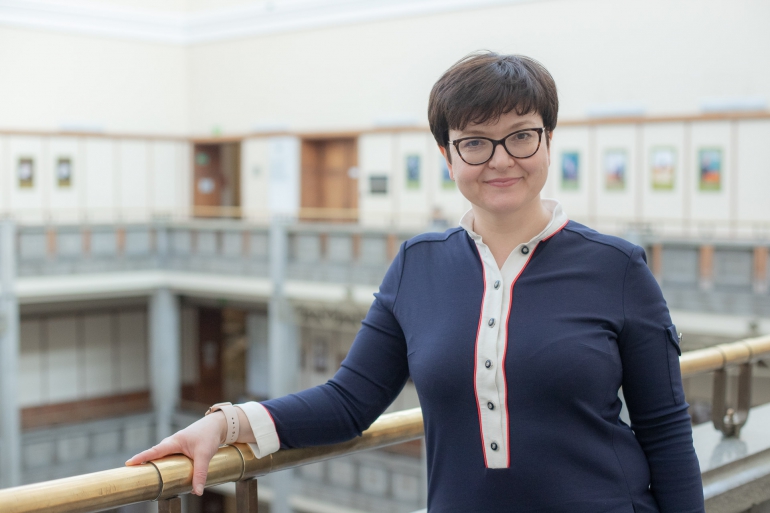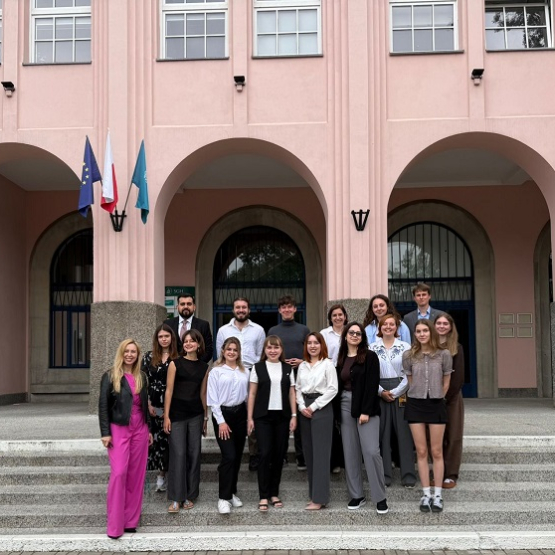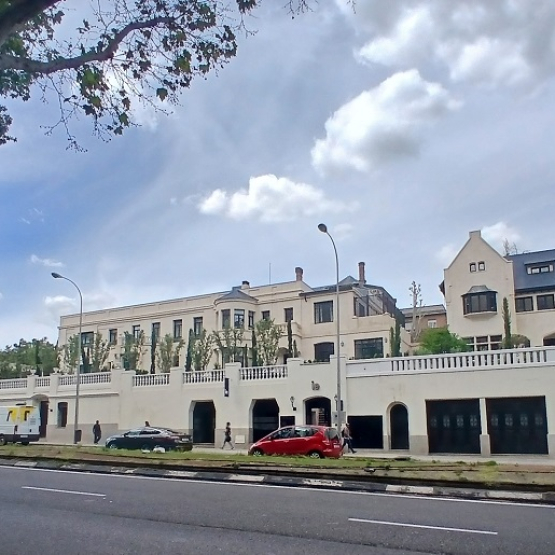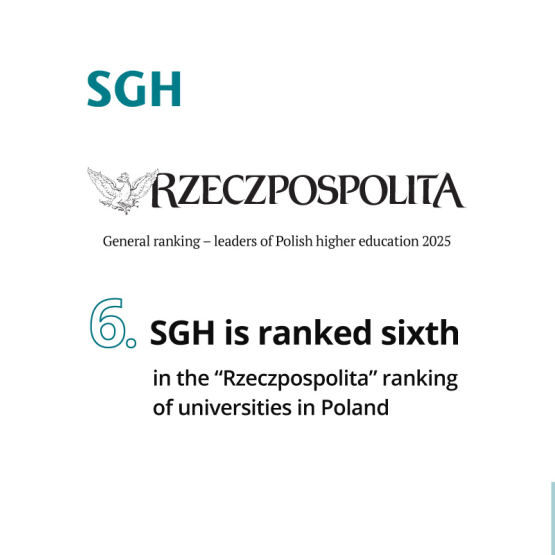
The SHARE health, activity and retirement processes survey has been running for 15 years. Gradually, it covered more and more countries. It is currently running in 28 European countries and in Israel. In Poland, it has been coordinated since 2007 by a team from the Institute of Statistics and Demography of SGH Warsaw School of Economics, headed by prof. Agnieszka Chłoń-Domińczak. What did we learn about Poles 50+ from the seventh round of the survey? How did they compare with citizens of other countries in their assessment of quality of life and health? And do we have public policies to support the so-called silver economy? Conversation with prof. Agnieszka Chłoń-Domińczak.
Magdalena Święcicka: The „SHARE 50+ in Europe” ( Survey of Health, Ageing and Retirement in Europe) Round 7 of the survey is behind us - interesting findings and recommendations. What is SHARE and what is it like to work on this long-term project?
Prof. Agnieszka Chłoń-Domińczak: There are two panel studies in Europe that aim to study demographic processes. One is the Generation and Gender Programme , which applies to people aged 18 to 50, and SHARE, which applies to people aged 50 and over. These two surveys allow us to follow the life course of individuals in the populations under study from starting a family, having children, starting professional work, etc. This is very important, because much of what happens to these individuals when they are 50, 60, 70 or 80 years old is due to their past experiences, and therefore directly influences the SHARE results.
SHARE, in terms of its scale and scope and its interdisciplinary nature, is a unique survey. It was prepared by a team of economists, demographers, psychologists, sociologists, but also doctors, who investigate how the situation of people aged 50+ develops and changes in Europe. SHARE is also a panel survey, which means that we have a group of respondents that we return to every two years. In this way, we know how their situation has changed over time. We can follow the transition from work to retirement, life in retirement, and also observe the moment when they develop their first serious health problems.
Survey of Health, Ageing and Retirement in Europe (“SHARE 50+ in Europe” ) is a panel study conducted among people aged 50 and over. Information is collected on health status, social relationships and financial and work situation. The survey has been conducted every two years since 2004. It currently covers 28 countries.
Another important feature of SHARE is that the survey is internationally comparable. We use the same tool to study Swedes, Poles, Germans, Spaniards, and we can compare the results with each other in a way that is absolutely scientifically correct.
Poland has so far participated in five rounds of the survey. What picture of the quality of life and health status of Poles aged 50+ is revealed by data from the latest SHARE survey?
– The latest data we have analysed is from Round 7 of the survey conducted in 2017. We are currently analysing data from a survey we conducted in late 2019 and early 2020 – the latter was suspended due to the COVID-19 virus pandemic, but in addition a telephone survey was conducted on the situation of respondents during the first wave of the pandemic.
We analysed the Round 7 data mainly in terms of social exclusion and health situation. It is worth mentioning that we have an additional set of questions specific to Poland. In this additional survey, one can focus on a selected topic - in this case it was the working conditions and health status of the respondents.
The results of our analyses have shown that the health of Poles begins to deteriorate as early as the age of 45 - much faster than in other countries. It is also clear that health status is related to work activity. One of the problems that plagues our labour market is the fact that people aged 50+ withdraw from the labour market relatively early due to health reasons. Among those who do not work but are not yet of retirement age, it is their health situation that prevents them from working - mainly chronic diseases and disabilities.
So although statistically we live longer, our quality of life drastically deteriorates even before we reach the age of 50, and instead of continuing to work for the next 10-15 years in relatively good physical and mental condition, we slowly begin to think about retirement?
– Poles relatively early think of themselves as people who should be heading towards retirement. We see this, among other things, in the responses to the question asked in SHARE: "Would you like to retire as soon as possible?” And indeed, among Poles the percentage of positive answers to this question is one of the highest in Europe. The situation is similar in Spain and Greece.
What influences this?
– The most important change is the mentality of Polish women and men. We should see ourselves as active people who, after the age of 50, are not yet ticking off the days until retirement, but are contributing professionally and socially. This attitude is also rooted in the labour market situation and, as I have already mentioned, in health assessment. In the conclusions of SHARE, we clearly emphasise the need for increased prevention, early health screening, good doctor-patient practices. Meanwhile, we learn, among other things, from the SHARE survey that we relatively rarely go to doctors or seek medical advice. Polish respondents were asked in SHARE how long ago they had done their periodic examinations. For those in employment, examinations were done regularly as this is a requirement. However, in the case of self-employment or when someone is unemployed, these examinations are either neglected or not carried out at all. So, in addition to the fact that the general state of health of Poles is bad, we ourselves do not do anything to diagnose certain problems relatively early. The situation is exacerbated by the ongoing pandemic and the various barriers associated with access to healthcare. Instead, we often and willingly take advice from "Dr Google" or other sources of information on the Internet, which can be risky in the long run. Prevention and easy access to examinations is one of the key recommendations of our survey for improving the health of people aged 50+.
Apart from declining health, are there any other reasons why people aged 50+ stop being economically active? Perhaps the blame lies with the labour market itself, which, as we know, does not tend to pamper so-called experienced workers.
– Here I refer to a study from 2015. We then asked a whole series of questions about respondents' job satisfaction. In SHARE we ask respondents not only "do you feel satisfied with your job", as most people usually answer "yes, I am satisfied". There is a number of questions in the survey about their level of satisfaction with different aspects of the job: do they feel they do a pressurised job, is it a hard physical work, do they feel there is an opportunity for promotion, skill development, do they feel valued by their supervisors and colleagues, are they satisfied with their pay. When we analysed all these factors together, we found that we can distinguish four groups of workers across Europe. The first are those who are satisfied in most of these aspects - here the Swedes and Germans are the leaders. We also have a group that is dissatisfied with everything - it is large, but not dominant - in Poland, the Czech Republic and the southern European countries. We also have two quite large groups who, you could say, are tired, mainly of the routine. In the first, persons maybe not perform hard physical work, but they have no opportunities for development, they are not appreciated - this causes discouragement. In the second group there are people who are happy overall, but their work requires adequate physical fitness, which they no longer have.
Which group of workers dominates in Poland?
– In Poland, these three groups - highly dissatisfied, tired of routine and tired of physical work - are dominant. We examined how the labour force participation of people aged 50-64 translates into job satisfaction. Where job satisfaction was higher at peri-retirement age, the proportion of people remaining economically active was also higher. So there is also much to be done in terms of working conditions, development and job satisfaction in the 50+ group. This is clearly lacking.
A mixture of poor health, unsatisfactory work, Polish mentality and still the constraints of an ongoing pandemic. This quality of life when you are over 50 is not encouraging. How do we compare with other European countries?
– If we look at the other 27 countries surveyed, we are somewhere in the middle of the pack. In general, Poles rate the quality of life worse than the Scandinavian countries, with Denmark, Sweden being the leaders. It is also worth noting that the Austrians, Germans, Swiss and French, i.e. the inhabitants of the continental countries, rate their lives better. People in the southern countries of Greece, Portugal and Italy, as well as in the countries of Central and Eastern Europe, rate them much lower. So, when we look at the whole group of countries, which we have been able to do since 2007, the situation in Poland does not look too bad.
Did the team of researchers from the Institute of Statistics and Demography of SGH Warsaw School of Economics develop recommendations for public policy on the occasion of the "SHARE 50+ in Europe"? What can be done to improve the situation of people over 50 in Poland?
– Yes, we have made clear recommendations. In the survey report we primarily focused on health recommendations. Firstly, we need early diagnosis, screening. We draw attention to the importance of working conditions - reducing physical strain, exposure to high temperatures or working in a forced position. We make it clear that deteriorating health translates into professional activity. This could also be a long-term care issue in the future. We have more and more seniors in Poland, more and more people needing care. In Poland, this care is mainly informal, family-based. Meanwhile, what is needed is a consistent and stable policy related to support for long-term care - not necessarily in the form of nursing homes or residential care, but also support for care at home at local, municipal level. We also need monitoring of the risk of social exclusion due to health reasons. People who are ill and have health problems experience a lower quality of life. Often it's a mental health issue - symptoms of depression that crop up.
It is very clear that Poles are lagging behind Europeans in terms of physical activity. Admittedly, changes are already taking place and younger people are becoming more involved in various activities. This should be strongly supported and one ought to promote a healthy lifestyle, which will bring measurable effect in 20 years' time, when every second Pole will have reached the age of 50. Early focus on today's problems of people 50+, development of effective methods of activation and support for seniors already now, may prove to be a good foundation for building public policy based on the needs of this social group, which will soon be the dominant one in Poland. The SHARE study certainly opens a wide field of discussion on what to do to "live better". It is worth taking advantage of this knowledge.
Media coverage of SHARE survey results:
Forbes Woman podcast with prof. Agnieszka Chłoń-Domińczak
A portrait of the 50+ generation. Main results of the 7th round of the "SHARE 50+ in Europe” study
Big Picture. Poland 50+. Forbes Women Report
Researchers work on a portrait of the 50+ generation in Europe



